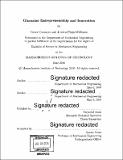Ghanaian entrepreneurship and innovation
Author(s)
Connors, Grace (Grace B.); Press-Williams, Jessica
DownloadFull printable version (8.485Mb)
Other Contributors
Massachusetts Institute of Technology. Department of Mechanical Engineering.
Advisor
Gwyndaf Jones
Terms of use
Metadata
Show full item recordAbstract
This study explores local innovation and entrepreneurship in Ghana. It presents the results of 28 in-person interviews with Ghanaian entrepreneurs who live and work in four cities across Ghana. The interviews detailed the entrepreneurs' business endeavors, backgrounds, and thoughts regarding Ghanaian innovation and entrepreneurship. The interview data was supplemented with a statistical analysis in order to observe trends among the entrepreneurs, and the main findings offer some insight into Ghanaian entrepreneurship. Overall, the interview participants found it relatively easy to start businesses in Ghana, and started businesses for a variety of reasons, which included a deficit of currently existing jobs and the desire to solve a local problem in an entrepreneurial way. In addition, the makeup of the businesses varied, and many included both a for-profit and philanthropic arms. The philanthropic arms of businesses also varied in terms of focus and informativeness. Although the cities in which the entrepreneurs are situated are very different, geography did not seem to impact the businesses' focus overall. The study also investigated the relationship of entrepreneurship to innovation in Ghana. Overall, we determined that entrepreneurship in Ghana does not always mean that innovation is occurring, and that many entrepreneurs seemed limited in their capacity to innovate. The study identifies several barriers to innovation in Ghana, including a lack of capital, infrastructure challenges, and an entrenched system of apprenticeship. Within the bounds of the study, the more innovative businesses tended to be headed by entrepreneurs who were more highly educated, and businesses with more innovative philanthropic arms tended to be started by entrepreneurs with more clearly-defined role models. The results of this study are not representative of the whole pool of Ghanaian entrepreneurs because the interview participants were not selected rigorously. The findings are intended to be used as guidelines for future work relating to entrepreneurship and innovation in Ghana, and potentially other developing countries.
Description
Thesis: S.B., Massachusetts Institute of Technology, Department of Mechanical Engineering, 2016. Cataloged from PDF version of thesis. Includes bibliographical references (pages 85-86).
Date issued
2016Department
Massachusetts Institute of Technology. Department of Mechanical EngineeringPublisher
Massachusetts Institute of Technology
Keywords
Mechanical Engineering.